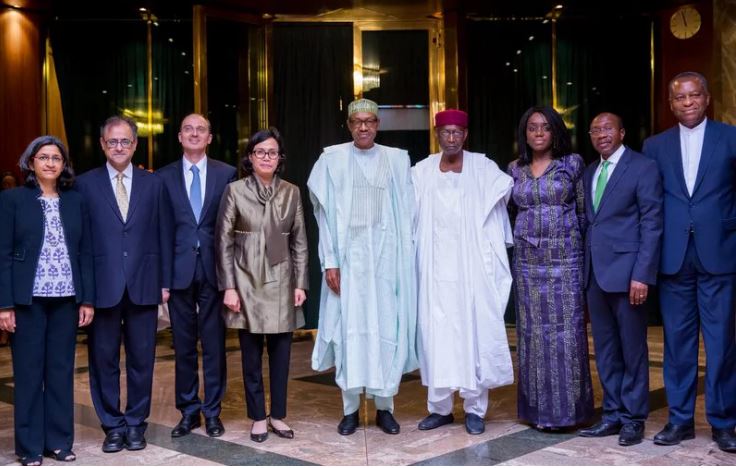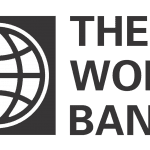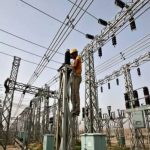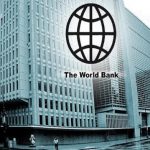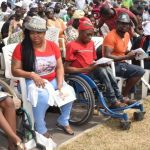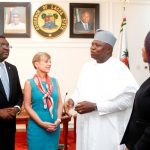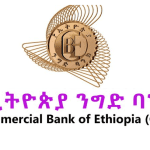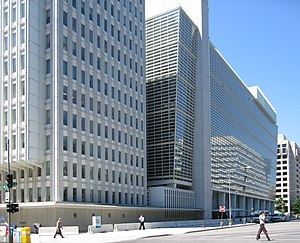 TVC N. The World Bank has so far committed the sum of $400 million into agriculture in Nigeria, its official, Shehu Salau has revealed. He further said the bank is to assist the country with another $200 million to develop its livestock at a time the federal government has raised an alarm over an impending hunger beginning from January 2017.
TVC N. The World Bank has so far committed the sum of $400 million into agriculture in Nigeria, its official, Shehu Salau has revealed. He further said the bank is to assist the country with another $200 million to develop its livestock at a time the federal government has raised an alarm over an impending hunger beginning from January 2017.
Leadership reports that Salau spoke at the regional wrap-up meeting of the West Africa Agricultural Productivity Programme (WAAPP) Implementation Support Mission in Abuja. “Our portfolio in Nigeria is about $400 million, but we have an engagement to scale up the support, we have a $200 million staple crop processing zone project, we also have about $200 million livestock project.
“World Bank have prioritised agriculture and energy because if you look at the economy of Africa, you will see that it is largely agrarian, so the bank stand worthy to push investment to support the government to achieve this objectives,” he said noting that the international financial organisation had prioritised agriculture and energy in the African economy .
The WAAPP-Nigeria programme ends this year and Salau said the country’s government was yet to state if it would continue with it. If the government refuses to continue with the programme, the World Bank cannot hold on to it, he said. “The World Bank works with the government and if the bank does not receive a request from the government to continue the project, the bank will comply. “As I speak now, the bank is yet to receive any official communication from the government of Nigeria to continue the programme,” Salau explained.
In his contribution, the ECOWAS commissioner for agriculture, environment and water resources, Tchambakou Ayassor, WAAPP programme in West Africa is aimed at achieving food security in the region. “ECOWAS adopted the agricultural policy (WAAPP), in 2005 and since then, so many programmes have been taken up to implement the policy, and in areas of research and agricultural productivity, we are implementing those programmes in order to reach the regions,” he said.
 TVC N. The World Bank has so far committed the sum of $400 million into agriculture in Nigeria, its official, Shehu Salau has revealed. He further said the bank is to assist the country with another $200 million to develop its livestock at a time the federal government has raised an alarm over an impending hunger beginning from January 2017.
TVC N. The World Bank has so far committed the sum of $400 million into agriculture in Nigeria, its official, Shehu Salau has revealed. He further said the bank is to assist the country with another $200 million to develop its livestock at a time the federal government has raised an alarm over an impending hunger beginning from January 2017.
Leadership reports that Salau spoke at the regional wrap-up meeting of the West Africa Agricultural Productivity Programme (WAAPP) Implementation Support Mission in Abuja. “Our portfolio in Nigeria is about $400 million, but we have an engagement to scale up the support, we have a $200 million staple crop processing zone project, we also have about $200 million livestock project.
“World Bank have prioritised agriculture and energy because if you look at the economy of Africa, you will see that it is largely agrarian, so the bank stand worthy to push investment to support the government to achieve this objectives,” he said noting that the international financial organisation had prioritised agriculture and energy in the African economy .
The WAAPP-Nigeria programme ends this year and Salau said the country’s government was yet to state if it would continue with it. If the government refuses to continue with the programme, the World Bank cannot hold on to it, he said. “The World Bank works with the government and if the bank does not receive a request from the government to continue the project, the bank will comply. “As I speak now, the bank is yet to receive any official communication from the government of Nigeria to continue the programme,” Salau explained.
In his contribution, the ECOWAS commissioner for agriculture, environment and water resources, Tchambakou Ayassor, WAAPP programme in West Africa is aimed at achieving food security in the region. “ECOWAS adopted the agricultural policy (WAAPP), in 2005 and since then, so many programmes have been taken up to implement the policy, and in areas of research and agricultural productivity, we are implementing those programmes in order to reach the regions,” he said.
 TVC N. The World Bank has so far committed the sum of $400 million into agriculture in Nigeria, its official, Shehu Salau has revealed. He further said the bank is to assist the country with another $200 million to develop its livestock at a time the federal government has raised an alarm over an impending hunger beginning from January 2017.
TVC N. The World Bank has so far committed the sum of $400 million into agriculture in Nigeria, its official, Shehu Salau has revealed. He further said the bank is to assist the country with another $200 million to develop its livestock at a time the federal government has raised an alarm over an impending hunger beginning from January 2017.
Leadership reports that Salau spoke at the regional wrap-up meeting of the West Africa Agricultural Productivity Programme (WAAPP) Implementation Support Mission in Abuja. “Our portfolio in Nigeria is about $400 million, but we have an engagement to scale up the support, we have a $200 million staple crop processing zone project, we also have about $200 million livestock project.
“World Bank have prioritised agriculture and energy because if you look at the economy of Africa, you will see that it is largely agrarian, so the bank stand worthy to push investment to support the government to achieve this objectives,” he said noting that the international financial organisation had prioritised agriculture and energy in the African economy .
The WAAPP-Nigeria programme ends this year and Salau said the country’s government was yet to state if it would continue with it. If the government refuses to continue with the programme, the World Bank cannot hold on to it, he said. “The World Bank works with the government and if the bank does not receive a request from the government to continue the project, the bank will comply. “As I speak now, the bank is yet to receive any official communication from the government of Nigeria to continue the programme,” Salau explained.
In his contribution, the ECOWAS commissioner for agriculture, environment and water resources, Tchambakou Ayassor, WAAPP programme in West Africa is aimed at achieving food security in the region. “ECOWAS adopted the agricultural policy (WAAPP), in 2005 and since then, so many programmes have been taken up to implement the policy, and in areas of research and agricultural productivity, we are implementing those programmes in order to reach the regions,” he said.
 TVC N. The World Bank has so far committed the sum of $400 million into agriculture in Nigeria, its official, Shehu Salau has revealed. He further said the bank is to assist the country with another $200 million to develop its livestock at a time the federal government has raised an alarm over an impending hunger beginning from January 2017.
TVC N. The World Bank has so far committed the sum of $400 million into agriculture in Nigeria, its official, Shehu Salau has revealed. He further said the bank is to assist the country with another $200 million to develop its livestock at a time the federal government has raised an alarm over an impending hunger beginning from January 2017.
Leadership reports that Salau spoke at the regional wrap-up meeting of the West Africa Agricultural Productivity Programme (WAAPP) Implementation Support Mission in Abuja. “Our portfolio in Nigeria is about $400 million, but we have an engagement to scale up the support, we have a $200 million staple crop processing zone project, we also have about $200 million livestock project.
“World Bank have prioritised agriculture and energy because if you look at the economy of Africa, you will see that it is largely agrarian, so the bank stand worthy to push investment to support the government to achieve this objectives,” he said noting that the international financial organisation had prioritised agriculture and energy in the African economy .
The WAAPP-Nigeria programme ends this year and Salau said the country’s government was yet to state if it would continue with it. If the government refuses to continue with the programme, the World Bank cannot hold on to it, he said. “The World Bank works with the government and if the bank does not receive a request from the government to continue the project, the bank will comply. “As I speak now, the bank is yet to receive any official communication from the government of Nigeria to continue the programme,” Salau explained.
In his contribution, the ECOWAS commissioner for agriculture, environment and water resources, Tchambakou Ayassor, WAAPP programme in West Africa is aimed at achieving food security in the region. “ECOWAS adopted the agricultural policy (WAAPP), in 2005 and since then, so many programmes have been taken up to implement the policy, and in areas of research and agricultural productivity, we are implementing those programmes in order to reach the regions,” he said.
 TVC N. The World Bank has so far committed the sum of $400 million into agriculture in Nigeria, its official, Shehu Salau has revealed. He further said the bank is to assist the country with another $200 million to develop its livestock at a time the federal government has raised an alarm over an impending hunger beginning from January 2017.
TVC N. The World Bank has so far committed the sum of $400 million into agriculture in Nigeria, its official, Shehu Salau has revealed. He further said the bank is to assist the country with another $200 million to develop its livestock at a time the federal government has raised an alarm over an impending hunger beginning from January 2017.
Leadership reports that Salau spoke at the regional wrap-up meeting of the West Africa Agricultural Productivity Programme (WAAPP) Implementation Support Mission in Abuja. “Our portfolio in Nigeria is about $400 million, but we have an engagement to scale up the support, we have a $200 million staple crop processing zone project, we also have about $200 million livestock project.
“World Bank have prioritised agriculture and energy because if you look at the economy of Africa, you will see that it is largely agrarian, so the bank stand worthy to push investment to support the government to achieve this objectives,” he said noting that the international financial organisation had prioritised agriculture and energy in the African economy .
The WAAPP-Nigeria programme ends this year and Salau said the country’s government was yet to state if it would continue with it. If the government refuses to continue with the programme, the World Bank cannot hold on to it, he said. “The World Bank works with the government and if the bank does not receive a request from the government to continue the project, the bank will comply. “As I speak now, the bank is yet to receive any official communication from the government of Nigeria to continue the programme,” Salau explained.
In his contribution, the ECOWAS commissioner for agriculture, environment and water resources, Tchambakou Ayassor, WAAPP programme in West Africa is aimed at achieving food security in the region. “ECOWAS adopted the agricultural policy (WAAPP), in 2005 and since then, so many programmes have been taken up to implement the policy, and in areas of research and agricultural productivity, we are implementing those programmes in order to reach the regions,” he said.
 TVC N. The World Bank has so far committed the sum of $400 million into agriculture in Nigeria, its official, Shehu Salau has revealed. He further said the bank is to assist the country with another $200 million to develop its livestock at a time the federal government has raised an alarm over an impending hunger beginning from January 2017.
TVC N. The World Bank has so far committed the sum of $400 million into agriculture in Nigeria, its official, Shehu Salau has revealed. He further said the bank is to assist the country with another $200 million to develop its livestock at a time the federal government has raised an alarm over an impending hunger beginning from January 2017.
Leadership reports that Salau spoke at the regional wrap-up meeting of the West Africa Agricultural Productivity Programme (WAAPP) Implementation Support Mission in Abuja. “Our portfolio in Nigeria is about $400 million, but we have an engagement to scale up the support, we have a $200 million staple crop processing zone project, we also have about $200 million livestock project.
“World Bank have prioritised agriculture and energy because if you look at the economy of Africa, you will see that it is largely agrarian, so the bank stand worthy to push investment to support the government to achieve this objectives,” he said noting that the international financial organisation had prioritised agriculture and energy in the African economy .
The WAAPP-Nigeria programme ends this year and Salau said the country’s government was yet to state if it would continue with it. If the government refuses to continue with the programme, the World Bank cannot hold on to it, he said. “The World Bank works with the government and if the bank does not receive a request from the government to continue the project, the bank will comply. “As I speak now, the bank is yet to receive any official communication from the government of Nigeria to continue the programme,” Salau explained.
In his contribution, the ECOWAS commissioner for agriculture, environment and water resources, Tchambakou Ayassor, WAAPP programme in West Africa is aimed at achieving food security in the region. “ECOWAS adopted the agricultural policy (WAAPP), in 2005 and since then, so many programmes have been taken up to implement the policy, and in areas of research and agricultural productivity, we are implementing those programmes in order to reach the regions,” he said.
 TVC N. The World Bank has so far committed the sum of $400 million into agriculture in Nigeria, its official, Shehu Salau has revealed. He further said the bank is to assist the country with another $200 million to develop its livestock at a time the federal government has raised an alarm over an impending hunger beginning from January 2017.
TVC N. The World Bank has so far committed the sum of $400 million into agriculture in Nigeria, its official, Shehu Salau has revealed. He further said the bank is to assist the country with another $200 million to develop its livestock at a time the federal government has raised an alarm over an impending hunger beginning from January 2017.
Leadership reports that Salau spoke at the regional wrap-up meeting of the West Africa Agricultural Productivity Programme (WAAPP) Implementation Support Mission in Abuja. “Our portfolio in Nigeria is about $400 million, but we have an engagement to scale up the support, we have a $200 million staple crop processing zone project, we also have about $200 million livestock project.
“World Bank have prioritised agriculture and energy because if you look at the economy of Africa, you will see that it is largely agrarian, so the bank stand worthy to push investment to support the government to achieve this objectives,” he said noting that the international financial organisation had prioritised agriculture and energy in the African economy .
The WAAPP-Nigeria programme ends this year and Salau said the country’s government was yet to state if it would continue with it. If the government refuses to continue with the programme, the World Bank cannot hold on to it, he said. “The World Bank works with the government and if the bank does not receive a request from the government to continue the project, the bank will comply. “As I speak now, the bank is yet to receive any official communication from the government of Nigeria to continue the programme,” Salau explained.
In his contribution, the ECOWAS commissioner for agriculture, environment and water resources, Tchambakou Ayassor, WAAPP programme in West Africa is aimed at achieving food security in the region. “ECOWAS adopted the agricultural policy (WAAPP), in 2005 and since then, so many programmes have been taken up to implement the policy, and in areas of research and agricultural productivity, we are implementing those programmes in order to reach the regions,” he said.
 TVC N. The World Bank has so far committed the sum of $400 million into agriculture in Nigeria, its official, Shehu Salau has revealed. He further said the bank is to assist the country with another $200 million to develop its livestock at a time the federal government has raised an alarm over an impending hunger beginning from January 2017.
TVC N. The World Bank has so far committed the sum of $400 million into agriculture in Nigeria, its official, Shehu Salau has revealed. He further said the bank is to assist the country with another $200 million to develop its livestock at a time the federal government has raised an alarm over an impending hunger beginning from January 2017.
Leadership reports that Salau spoke at the regional wrap-up meeting of the West Africa Agricultural Productivity Programme (WAAPP) Implementation Support Mission in Abuja. “Our portfolio in Nigeria is about $400 million, but we have an engagement to scale up the support, we have a $200 million staple crop processing zone project, we also have about $200 million livestock project.
“World Bank have prioritised agriculture and energy because if you look at the economy of Africa, you will see that it is largely agrarian, so the bank stand worthy to push investment to support the government to achieve this objectives,” he said noting that the international financial organisation had prioritised agriculture and energy in the African economy .
The WAAPP-Nigeria programme ends this year and Salau said the country’s government was yet to state if it would continue with it. If the government refuses to continue with the programme, the World Bank cannot hold on to it, he said. “The World Bank works with the government and if the bank does not receive a request from the government to continue the project, the bank will comply. “As I speak now, the bank is yet to receive any official communication from the government of Nigeria to continue the programme,” Salau explained.
In his contribution, the ECOWAS commissioner for agriculture, environment and water resources, Tchambakou Ayassor, WAAPP programme in West Africa is aimed at achieving food security in the region. “ECOWAS adopted the agricultural policy (WAAPP), in 2005 and since then, so many programmes have been taken up to implement the policy, and in areas of research and agricultural productivity, we are implementing those programmes in order to reach the regions,” he said.

